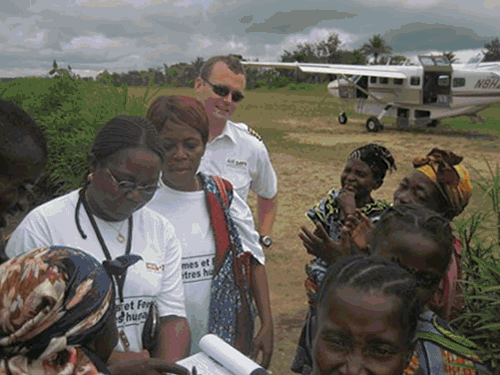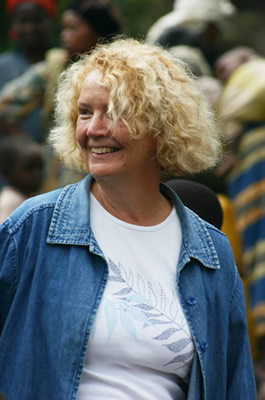
|
|
|
| Home » |
Lyn Lusi - Day in the life of HEAL Africa's Co-founder 2010
If I tell you about my day today, please do not assume that it is a typical day. It is not. Most of my days are spent swamped in paper. Today was different. I went from Kasongo to Wamaza to visit our Gender and Justice work, to meet the people who are working with us, and meet the people who are benefiting from the project. We flew in on a small Caravan, and this pilot took back to Goma five patients needing fistula repair. These ladies are so young, so small, so tired and defeated. I know they will come back here in a few months, healed and well fed, blossoming like a rose. We were supposed to leave at six in the morning. Promptly on time, was standing outside, ready to go, once again naively expecting time to be time. Will I never learn, even after 38 years in Congo? It was not difficult for me to be up at that time, and because on both sides of the house there was a funeral (two funerals) and the singing and drumming went on all night through till 5 AM, when I thought I might as well get up. We left at eight o'clock. That was a rough 3 hour ride, for 75 kilometres, and everyone kept assuring me that this is the best road in south Maniema; its identity is Nationale 2. I was struck by the fact that after 15 km out of Kasongo, not one village has one single shop, all the way to Wamaza. It appears that people do their shopping once a week, when the market happens nearby. And I saw a few peddlers, walking or bicycling through the villages, with their colourful wares draped around them like a cloak. We had just arrived on the outskirts of Wamaza when we were swarmed by a huge crowd of women dancing and singing, waving branches or cloths, so we got out of the car and danced the last kilometre to the Wamama Simameni house. Our first task was to greet the government administrator. He and the Chef de Groupement obviously get on very well together, and they both love this project which tries to bring women up to the level of men in society and family. Since the President has stated that gender equity is one of the five goals of his presidential mandate, government officials and delighted to have a program in their circumscription that focuses on this. He agrees with as that Wamama Simameni groups must start campaigning for women candidates at the next election. The men are not going to stand in their way. But looking around the room at the women who were there with us, I saw not once spark of enthusiasm for political office: they were all studying their feet with great attention. We went across the road to see Wamama Simameni house, already half way up to the lintel. When I told the administrator and all the women that this house does not belong to HEAL Africa: it belongs to the Wamama Simameni group, once again there was great dancing and yodelling. The ladies of Wamaza served us a delicious lunch. Then we started meeting all the different groups being touched by our project. We talked to the fieldworkers taking the message of Justice for women into their communities; and five energetic women who teach other women to read. Just five women for all of the zone of Wamaza? Two of the ladies have taken the initiative to teach other women in their church or mosque how to teach adult literacy. They did not keep their knowledge to themselves because knowledge is power: they shared their skills and set an amazing example to other people.They showed me some letters that women had written after they learned to read and write. One particularly touched me: it said: Letter to Mrs Lyn. I have learned to read and write. Now my husband respects me at home. Now my husband helps me in the field. Thank you. Salima. We met some of the associations who have received microfinance capital, and who are managing their small co-operative banks. These associations are called TKM (Tujiunge Kwa Mkopo - United for loans). Already they have a startlingly good record for reimbursement. One key feature is that as soon as the group reimburses another new group is formed to receive a loan they pay a small interest of 2% and that covers costs of administering the loan. After they had finished saying their piece, they went out and another group came in – also TKM. But this group did not want to sit down with the others; they brought me a special gift and explained why they wanted to have this time on their own. They had eight members, all of them very beautiful young girls. They all had babies from rape. Some of them had been thrown out of their families, and were living on their own. For them, TKM represents an escape from prostitution, or the humiliation of being forced to marry someone they detest. TKM gives them autonomy and dignity. Then we met the Nehemiah committee of Wamaza, and I understood why this place has been so successful in gender justice. In this committee there are an equal number of men and women. The secretary, a man, gave me their gift (three statues of women) and explained what we need to do to lighten the load of women in the community: get a good clean well so they don't have to walk for hours to get water; and bring a mill, so women don't have to spend their hours and energy grinding manioc or husking paddy rice. But no one suggested men should help women with these chores! 
During these discussions, it was raining hard outside. I had forgotten the state of the road. By 3.45pm our Landcruiser was packed really full, and on top of the luggage rack were two goats. They never stopped crying the whole way home. One was saying, Aaaaaagh! And the other: Oooh Maamaa! sounding for all the world like tortured children. The road could not have been worse: it was slippery like ice. Our driver was very competent but on one impossible hill he lost control and we went into the ditch. No one was hurt, and I climbed out of my side of the car, only to find myself standing in the middle of the world congress of soldier ants. In no time, they are up the inside of my trousers, in between my toes, hanging onto my fingers as I try to brush them off. There are some pictures in my mind that I want to keep hold of. I loved to watch the bright red spray from the muddy puddles shining in front of the headlamps like lava from the volcano. And then, what a relief to get back to Kasongo, and see all the little vendor stalls by the side of the road, each with its palm oil lamp in tomato paste cans: it looks like church on Christmas night. They are so unused to cars in Kasongo that they set up their night market stalls in the middle of the street. So tomorrow we will go to Kipaka. I have been warned: tomorrow we really do start at 6 AM. So shall I believe that, or get an extra hour’s sleep? |
|
Our Mission Providing holistic care including physical, spiritual and social healing for the people of the Democratic Republic of Congo; training for health professionals; support to strengthen communities; encouragement for women in community leadership roles; and support for education and vocational training. Copyright © 2011 HEAL Africa is a registered 501(c)(3) charity | EIN#20-4104936 All Rights Reserved. |

